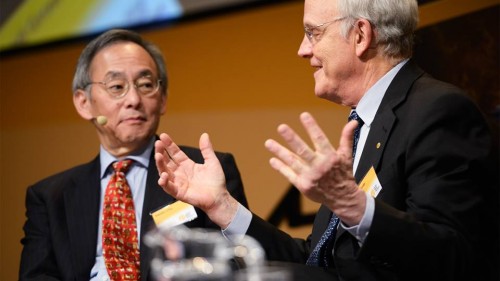By Michael Banks
Yesterday I joined more than 1000 people attending the day-long Nobel Week Dialogue event in Gothenburg, Sweden. The delegates battled the cold winter weather to make it to the Swedish Exhibition and Congress Centre, just south-east of the city centre (and next to a theme park, of all things).
This is the second such Nobel Week Dialogue and the first time it has been held in Gothenburg. Last year the theme for the event in Stockholm was the “genetic revolution” and this year it was on “exploring the future of energy”.
The free meeting, which was also streamed live online, aimed to “deepen the interaction” between the scientific community and society. The 36 panellists included top scientists and leading business leaders such as the chairman of BP, Carl-Henric Svanberg, as well as the physics Nobel laureate Steven Chu.
I was one of 11 bloggers for the event and you can read the team’s blog posts here.
One aspect I came away with was the difference in views regarding renewables among scientists and some in the business world.
BP for one suggests that renewables won’t play a major role in the energy mix even by 2035, putting the share of renewable energy somewhere on a level with nuclear (around 5% of the total energy supply). The oil giant even thinks that renewables could reach a maximum energy share around 2030 and decrease afterwards. Scientists think, and probably hope, otherwise.
Nuclear power also had a mixed reception. In any case it seems like it will remain as a reliable “base” in the energy mix. Fatih Birol, director of global energy economics at the International Energy Agency, said that we “cannot afford” to exclude nuclear.
However, Chu, a former US energy secretary from 2009 to 2013, noted there were four issues with nuclear power – safety, proliferation risks, the problem of nuclear waste and finally the huge upfront costs that are needed to build nuclear plants in the first place.
He even went as far as to say that by the end of this century we won’t need nuclear power, pointing out that renewables could take over instead.
For those thinking that nuclear fusion might provide all our answers, Chu suggested that it “might not even work” – a view that seemed to be backed up by fellow physics Nobel laureate Carlo Rubbia, who says that he is not convinced by fusion and that current research based around the fusion of hydrogen isotopes is “a step in the wrong direction”.
It’s hard to reach any kind of conclusion on such a vastly ranging topic as energy, but one thing seemed clear: something has to be done about ballooning carbon emissions. It is high now, never mind when the world’s population increases to nine billion as it is set to do over the coming decades or as the developing world becomes more energy hungry.
It seems like the Nobel Week Dialogue has hit a rich vein, in which the debate will continue for a long time to come.

I looked at the programme:
http://www.nobelweekdialogue.org/programme/programme/
It seemed slanted towards renewables, with talk of reduced energy usage and climate change but no mention of thorium. See Kirk Thorensen re the latter:
http://www.peakprosperity.com/podcast/79398/kirk-sorensen-detailed-exploration-thoriums-potential-energy-source
Right, the avaiable thorium (Th-232) reserves are about four times higher than that of Uranium, but this Th-232 per se is not fissionable with the thermal neutrons. It has to be converted into the fissionable U2-233 and this is the major obstacle for its use as a nuclear fuel. However, there are the ways to do it. Moreover, the Th-232- U-233 cycle has the virtue to produce very little quantities of the highly radioactive heavy actinides as in the case of Uranium-Plutonium cycle.
Although the nuclear energy is the most dense and fundamentally carbon free of all the available sources of énergies, it needs the highest standards of safety and a reasoable solution for it radioactive waste. Howeover, due its very special nature, one simply cannot install nuclear reactors everywhere on the Earth. For this reason, the development of carbon free and affordable renewable energies are indispensable. Finally, one has to learn to use the energy in the most economical and efficient way possible.
I see possibilities in superconducting matterials of coils of turbogenerator and also electricity conducting wires that should stop loss of energy by heat. If we find superconducting matterials cheap and room temperature it can be very strong for electronics ( one such matterial seems to me is graphene ). Also graphene will be main part of graphene processor and these processors will be superconducting so it save many energy.
Is entanglement tied with ultracold systems or only with superconducting matterials? Imagine we can have superconducting matterial that change ultracold conditions instead of them. Can be such matterial due to superconductivity entangled for long time at room temperature? Can we entangle graphene?
This idea involves extracting the Cooper pair, the most entangled
state found in matter, into different sheets such that the electrons involved are not paired but
remember their original correlations. Imagine we can do it in potential holes. I think this can be possible.
I knew Steven Chu wasn’t very bright in matters of energy, but I had no idea he was so naïve. Indeed, a society can live in a sustainable way with low density energy sources. The Amazonian tribes do so. The question is what level of development are you willing to accept. As a congressman once told him: He may be a Nobel laureate in Physics, but he can’t add 1+1 in Economy.
As for Rubbia, it isn’t eve worth commenting. Not even the High Energy Physics community wants him.